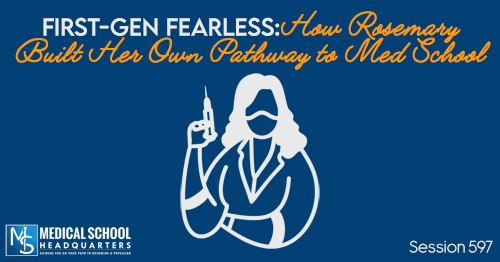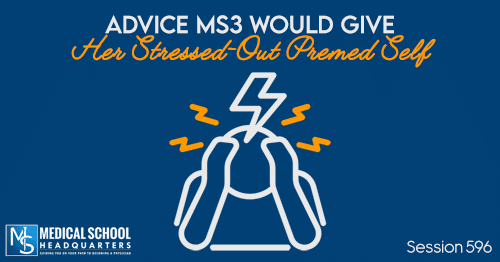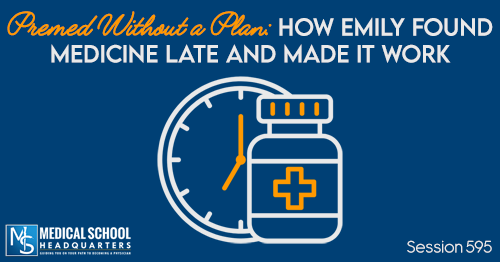I’m not in high school or haven’t started college and know I want to be a physician. What can I do?
The first and most important thing you can do as a premed is learn to be a good student. At this point in school, you may be able to do well in your courses without spending much time studying. This is likely to change when you get to college. Regardless of how much other work you have, you’re expected to preview the course material before coming to class. Even if your professor hasn’t explicitly assigned these readings or other homework, this is typically true.
If you struggled in your high school science classes, you could still do well in college while completing your medical school prerequisites. Take every failure as an opportunity to reassess your methods and find a better way of doing things. Reflecting on your failures is the only way to improve. If you’re never failing, you’re not trying enough new things.
Success in College
One of the first decisions you’ll make about college is where to go. In the end, prestige is not the most critical factor, and you should choose a school where you feel you can succeed and enjoy your experience in college.
When you do get to college, you don’t have to give up everything but school and medicine. You may have to let some things go for time if they’re not a priority for you, but if there’s something you enjoy doing and you’re able to make time for it, keep doing it. It’s also a good idea to give yourself time to settle into college and get used to the workload and structure of big, university-level science classes.
Another way to set yourself up for success right at the beginning of college is to meet with your advisor a few weeks into the semester. They can give you an idea of what the premed path looks like at your specific university and what experiences may be available in your area. They can also set expectations of what success will look like for you and the tasks needed to reach it. Building this relationship early can help you get the most out of their advice and the resources your school can offer you.
Extracurricular Activities
Your high school activities won’t go on your medical school application unless you continue doing a particular activity in college. When deciding what extracurriculars to do in high school, don’t worry about how it will look on your future medical school applications. Choose things you will enjoy doing. You’ll be happier if you prioritize your passions. Not overfilling your schedule will also help you prioritize your academic success. Whether in high school or college, don’t choose activities because they’re what a premed “should do.”
Clinical Experience
You can also try to gain experience caring for people or being in a clinical environment. This will be more difficult the younger you are, but volunteer activities may be more flexible. The closer you get to applying to medical school, the more critical that these roles involve actual patient contact. Performing well in the position you can get may lead to more opportunities in the future as your supervisors get to know you and as you get older, depending on the policies where you’re volunteering. Positions like a medical assistant or hospice volunteer may not require more than a high school diploma or GED. That makes them a good opportunity for students fresh out of high school.
Undergoing EMT or CNA training can also be an asset that will open up additional opportunities to get clinical experience. This is especially valuable if the vast majority of clinical roles in your state require certification. Medical scribing also does not require a license, and training is generally done after hiring. The training can be intense, but you will learn a lot about the physician-patient relationship. It doesn’t show you whether you enjoy patient care, so it’s a good idea to keep yourself open to other opportunities. Your exposure to medicine and patient care can happen in a hospital, private practice clinic, or in an ambulance as an EMT. Deciding what role is right for you comes down to what you’re interested in doing, what’s available, and what you’re hoping to get out of your experiences.
Shadowing
This is also a good time to lean on your network. If there are any physicians in your social circle, you can reach out to them for advice. They may also be able to connect you with volunteering or shadowing opportunities. If you don’t specifically know any physicians, anyone who works in healthcare can be helpful to you either because they might know other people who would also be willing to help you, and they can tell you more about the role they serve. A good way to get started is to join in eShadowing! You can register to join live sessions or watch previous sessions on our YouTube channel.
Apple Podcasts | Google Podcasts
BS/MD and Dual Degree Programs
If you are highly motivated and sure you want to be a physician, you might be a good fit for a BS/MD or BS/DO program or other early admittance programs. The length of these varies from school to school, so you’ll want to research what your coursework and college experience will look like if you enter one of these programs. Some are six-year programs, and others are seven-year programs or the typical eight years. Six years is a highly accelerated timeline and cuts the amount of time you spend in college in half. Only you can know whether that’s a good fit for you.
Spending more time in school can allow you to mature before entering your medical training. Going through college in a typical path may allow you more flexibility in the GPA you maintain. Choosing to pursue one of these programs comes down to what you want the next several years of your life to look like and if the benefits outweigh the risks and downsides for you. If a school provides a pathway for hearing from students and faculty, that’s a great way to decide if a school is right for you. You can feel utterly sure about pursuing medicine and still choose not to pursue a combined degree program.
Apple Podcasts | Google Podcasts
Focus on the Path Just Before You
There are a few questions that many young premeds ask frequently. Some of those aren’t worth worrying about for at least another year or two. While you are still early in your journey, focus on the stage you’re at now and begin thinking about the one directly after. Attempting to view and plan for the entire path at once will be overwhelming. In high school, focus on becoming a good student, finding what you enjoy doing, and choosing a college.
I also want to remind you not to enter college with the attitude that your classmates are your competition. This is your current community and, hopefully, your future colleagues. In Session 434 of The Premed Years, I explain why you should only be competing with yourself and not your classmates. Collaboration, not competition, is the key to your success.
More Links and Resources
What Do Medical Schools Think of Community College Classes?






